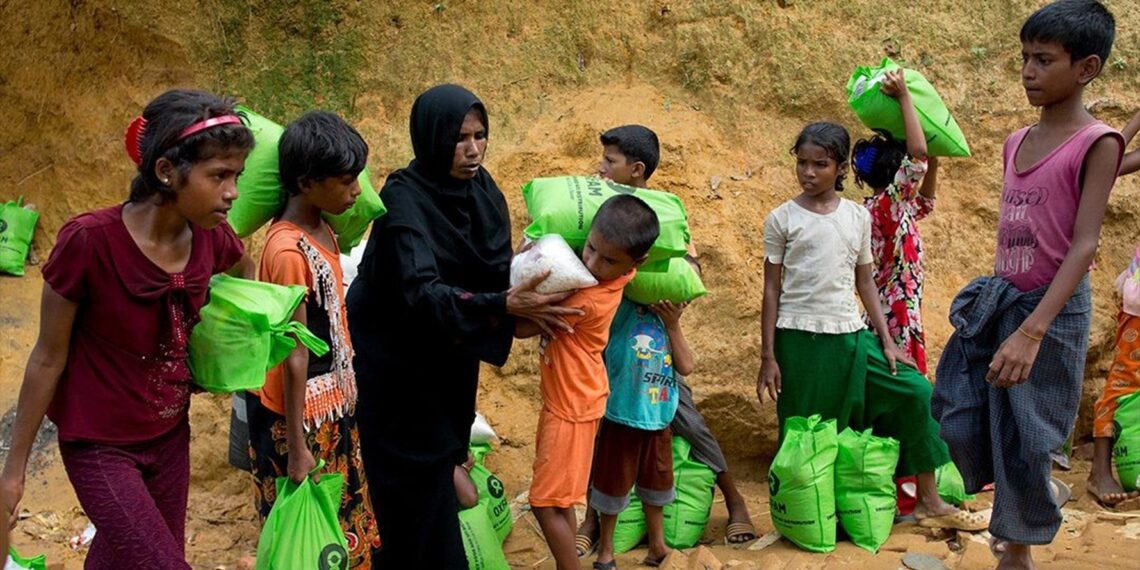A few days ago, a group of British lawyers specialised in legal issues arising out of international cases in the International Criminal Court (ICC), landed in Dhaka before becoming actively involved among the Rohingya refugees living in Kutupalong and Nayapara.
Bangladeshi sources familiar with the presence of these lawyers and the larger issue of Rohingya repatriation in general and the controversial “human corridor” proposal of the Mohammad Yunus interim authority said the visiting legal practitioners will be in Cox’s Bazar for about a week more.
The British lawyers’ presence in Cox’s Bazar is being kept a closely guarded secret lest word goes out of the Yunus regime’s strategic moves on a likely Rohingya repatriation, the continuing violence against by the Arakan Army in the Rakhine State and the wider pros and cons of the thorny humanitarian corridor proposal that has not had many takers across Bangladesh’s political landscape.
The British lawyers, sources said, are closely studying two cases – Myanmar and Gambia – where there have been allegations of genocide.
They are poring over a November 15, 2023, document which focus on the intent of six European states, including of Canada, Denmark, France, Germany, the Netherlands and the United Kingdom.
This intent, sources said, appears to be on a “joint declaration of intervention” in Myanmar that aims to achieve a “common interest in the accomplishment of the high purposes of the Genocide Convention”.
A Press note issued by the International Court of Justice on December 20, 2024, based on the “Application of the Convention on the Prevention and Punishment of the Crime of Genocide (The Gambia v. Myanmar: 7 States intervening)”, held that the “interventions” were “admissible”.
In its stand on the alleged genocide in Myanmar, the West African republic of The Gambia affirmed that the Genocide Convention was violated through “acts adopted, taken and condoned by the Government of Myanmar against members of the Rohingya group.”
Specifically, The Gambia argued that “from around October 2016 the Myanmar military (the ‘Tatmadaw’) and other Myanmar security forces began widespread and systematic ‘clearance operations’ —the term that Myanmar itself uses — against the Rohingya group. The genocidal acts committed during these operations were intended to destroy the Rohingya as a group, in whole or in part, by the use of mass murder, rape and other forms of sexual violence, as well as the systematic destruction by fire of their villages, often with inhabitants locked inside burning houses. From August 2017 onwards, such genocidal acts continued with Myanmar’s resumption of ‘clearance operations’ on a more massive and wider geographical scale”.
Now, sources in Dhaka said, an attempt in being made to revive The Gambian application on Myanmar and that this will be the basis of all future strategies involving the humanitarian corridor on one hand, “responsibility to protect” (on the part of states who have filed applications in the ICJ against the Myanmar military junta) and even a no-fly zone in the Rakhine.
But this complicates the Rakhine State issue as there are attempts to enlist the Bangladesh Army’s support for the humanitarian corridor over which the armed forces are not only deeply divided but suspicious of larger western intentions involving the Myanmar region and beyond.
ALSO READ: Assamese innovator launches MK3 AI chatbot, aiming to reach 100 crore users
In this context, Bangladesh foreign ministry sources said that a representative from The Gambia was in Dhaka a couple of months ago ahead of the visit of UN Secretary General Antonio Guterres in March.
At that time, it was decided during a meeting between officials that Bangladesh’s National Security Adviser Khalilur Rahman, who is also the designated High Representative on Rohingya Issues, would travel to New York in September to focus on the three issues of “safe zone” (later rechristened ‘humanitarian corridor’), R2P or “responsibility to protect” and a no-fly zone.















